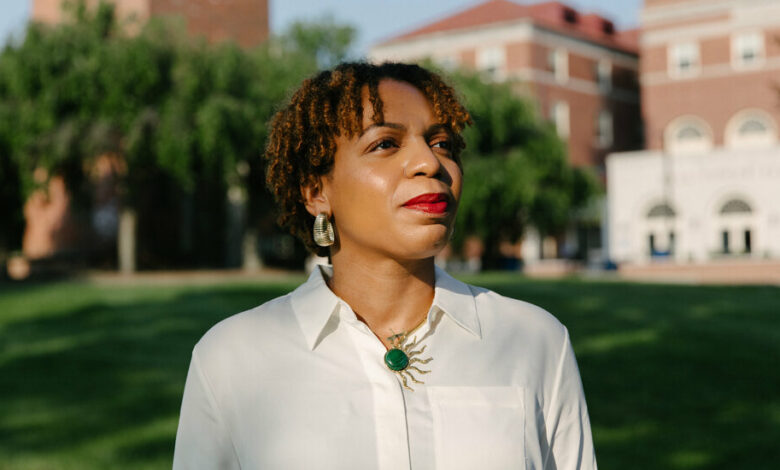Employees with autism find new ways to navigate the work environment

When Chelsia Potts took her 10-year-old daughter to a psychologist to be tested for autism spectrum disorder, she decided almost as an afterthought to get tested herself. The results came as a surprise. Like her daughter, Mrs. Potts was diagnosed with autism.
Ms. Potts, 35, thought she might be struggling with anxiety or some other problem. A first-generation college student, she had earned a doctorate in education and had risen to become a top administrator at Miami University in Oxford, Ohio. But after seeing a psychologist, she had to figure out how her diagnosis would affect her work life.
“At first I was confused and kept it to myself,” Ms. Potts said. “I had this image of what someone with autism looked like, and it didn’t look like me.”
She considered the ways she had compensated in the past in an attempt to hide her disability and appear as a model employee – a coping mechanism known as “mask.”
For years, she had tried to avoid meeting with colleagues one-on-one, as she felt uncomfortable in a group setting. She reminded herself to smile and sound enthusiastic, knowing that some people found her voice overly serious. She also tried to avoid bright lights and noise in the workplace.
After struggling with her diagnosis for six months, Ms. Potts met with a university official. That conversation “was one of the most difficult experiences of my life,” she said.
“I’m telling someone something I’ve never told anyone outside of my family,” she continued. “I felt very vulnerable. I felt ashamed. I realized how hard it was for me to say what I needed and why I needed it.”
But the meeting led to positive changes for Ms. Potts: she was given a number of adjustments, including a more flexible work schedule.
A number of major employers in the United States, including Microsoft, Dell and Ford, are taking steps to make workplaces more accessible and welcoming to neurodiverse employees as autism diagnoses rise.
The Centers for Disease Control and Prevention estimates that one in 36 8-year-olds in the United States has autism. That’s up from one in 44 in 2018 and one in 150 in 2000, an increase that experts attribute in part to better screening. In addition 2.2 percent of adults in the country, or 5.4 million people, are autistic, according to the CDC
More and more autistic people are also publicly identifying themselves. Ms Potts is one of many TikTok users who have shared their diagnoses online using the hashtag #autistok.
Last year the singer was She revealed that she had been diagnosed with autism as an adult. More recently, author Mary HK Choi described in an essay for New York magazine about how she developed great self-awareness at age 43 as a result of her diagnosis.
Autism activists are praising companies that have become more open to remote work since the coronavirus pandemic.
Workplaces with too much light and noise can overwhelm people with autism, potentially leading to burnout, said Jessica Myszak, a clinical psychologist in Chicago who specializes in autism testing and evaluation. Working from home “reduces the social demands and some of the environmental sensitivities” that autistic people struggle with, Dr. Myszak added.
But navigating the job market remains a challenge for autistic people, who are more likely to be unemployed or underpaid, according to advocacy groups. And autistic job applicants hoping to make a good first impression may be hesitant to disclose their diagnosis or ask for accommodations.
“You don’t want them to see your flaws,” she said Haley Moss29, a lawyer and activist for people with autism, compares the job interview to a first date.
Microsoft is recruiting
When Natalie Worden-Cowe, 32, was a professional musician, she struggled with the networking side of the business, a key to landing gigs. When she decided to change careers a few years ago and become a software engineer, she struggled to get through job interviews. Her professional life changed when she discovered Microsoft’s Neurodiversity Recruitment Programwhich was founded in 2015.
The company’s program is modeled after a venture started by German software company SAP and has since been adopted in one form or another by companies including Dell and Ford. So far, the initiative has brought about 300 full-time neurodivergent employees to Microsoft, said Neil Barnett, the company’s director of inclusive hiring and accessibility.
“All they needed was this different, more inclusive process,” Mr. Barnett said, “and once they joined the company, they thrived.”
Ms. Worden-Cowe, who was diagnosed at age 29, noticed the difference at Microsoft as early as her job interview: She was given extra time to answer questions and time between meetings with company employees.
“People from neurodiverse backgrounds may need a little more processing time, or they may want to have the questions on paper,” Ms Worden-Cowe said.
Once on board, she was assigned a job coach to help her with time management and prioritization. Microsoft also paired her with a mentor who showed her around the company’s Redmond, Washington, campus. Perhaps most importantly, she works with managers who have undergone neurodiversity training.
The Microsoft campus also has “focus rooms,” where lights can be dimmed and desk heights adjusted to suit sensory preferences. Workers in the open office can also request to sit away from busy aisles or receive noise-canceling headphones.
“Agendas are sent out in advance,” Mr. Barnett said. “Everyone’s communication style and preference is noted.”
Mr Barnett dismissed the misconception that such adjustments cost companies revenue, efficiency or productivity. Instead, he said, they improve work culture and the overall well-being of staff.
Wendi Safstrom, the president of the Association for Human Resource Managementa nonprofit organization, said more employers should make an effort to recruit neurodivergent people and educate their employees about them. “If they’re not willing to move with the times, they’re going to be left behind,” Ms. Safstrom said. “The war for talent is real.”
Ms. Moss, the lawyer, said human resources departments were willing to change. “In most cases, they already have autistic employees who haven’t disclosed it,” she said. And yet, she added of autistic employees, “many of us are not getting promoted.”
More employers should put neurodivergent people in leadership roles, Ms. Moss said — essentially redefining what it means to be a boss. “You can be someone who communicates outside of what’s considered normal and be a great leader,” she said.
‘My authentic self’
For Murphy Monroe, communicating at work was never a problem. The highly verbal Mr. Monroe, 50, excelled because he could quickly recall statistics about the organization he worked for and its competitors.
Since childhood, therapists told him he was likely on the autism spectrum, but because he had never been tested, Mr. Monroe tried to avoid the issue. As a teenager, he knew he was different and was “actively afraid that he wouldn’t be able to hold down a job,” he said.
He studied theater in college and pursued a career in education, working for 17 years as an admissions officer and executive at Columbia College ChicagoLike Ms. Potts, the Miami University administrator, Mr. Monroe devised strategies to navigate the work environment, including shadowing a trusted colleague who helped him pick up on social cues he might have missed.
“Is there anyone I need to apologize to?” Mr. Monroe would ask after meetings. “What just happened?”
“I chew on my fingers,” he added, referring to a form of stimulatebehaviors that help some autistic people manage sensory overload. “I’ve been in a meeting with the president of the university or in front of a board and I can’t stop myself from making myself bleed. These are times when it’s nice to have someone in the room to tap me to leave.”
At one point, Mr. Monroe told a human resources manager that he thought he had a form of autism that caused him to be overwhelmed by sensory input, particularly light. “She looked right at me and said, ‘You’re not autistic,’” Mr. Monroe recalled. “From that point on, I didn’t think about it for years.”
But after watching TikTok videos of people talking about their experiences with autism, Mr. Monroe made an appointment with a psychologist in 2021, where he got confirmation of what he had long suspected.
That self-knowledge has informed his current approach to his current job as executive director of the actors gymnasiuma circus school in Evanston, Illinois. “I really felt the need to just be open at work,” Mr. Monroe said. “I just dove into it. I bought a gold autism pin on Etsy and started wearing it all the time.”
He also gives himself accommodations, like days away from the workplace to recharge and dark curtains in the office. He also tries to be sensitive to his colleagues, he said, and allow them to adjust their schedules or tasks in ways that make sense to them, whether they’re neurodivergent or neurotypical.
In short, he’s trying to recreate the atmosphere he wanted when he was still wearing a mask to get by. It’s the kind of workplace that many autism activists hope will become more common.
“Being able to be completely myself while running a joyful business,” Mr. Monroe said, “makes me feel like the luckiest man ever.”




